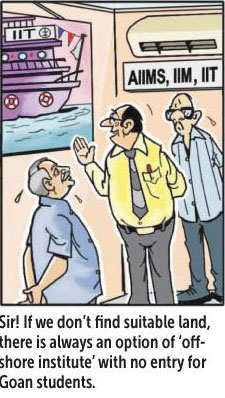Minorities and jobs
Coming as he does, from a political ideology which often lambasts “minoritism” and “pseudo-secularism”, it is strange to see BJP leader of the Opposition Manohar Parrikar shed tears over the lack of government jobs for minorities. Parrikar said (Herald, April 5) that he tabulated the information gathered from official records, and was “shocked” with the findings.
There are a few issues that come to mind immediately. The BJP in Goa would like to promote its own worth, by pointing out that the Congress is simply worse. This is a game it has long indulged in. The Congress is more corrupt, has more controversial leaders (never mind where they were earlier), and the Congress is worse at managing affairs... As the most visible alternative, the BJP seeks to claim support based on the fact that there is little option. Strangely, during its term in power, the BJP was itself racked by a number of controversies, especially on how fair-minded it was while dealing with issues of community and caste. Maybe such fears were, in turn, stoked by other politicians (including Congressmen), who understand the fears - justified or otherwise - that various sections of the population feel.
That the BJP did “better” than the Congress is little consolation, especially if Parrikar’s figures are right. Interesting, no one among the minorities themselves have raised such concerns. If people trust the Congress, and not the BJP (despite the latter’s better record, according to Parrikar), then the BJP must ask itself why. One cannot dismiss this saying it is merely propaganda.
As far as Goa itself goes, the issue of jobs in government has long been a controversial one. In colonial times, discrimination - subtle or systemic - was widespread. Anthropologist Robert S Newman suggests that a Hindu could not become a schoolteacher in colonial Goa, till 1910 and the Portuguese Republican Revolution. Others however point to the Hindu dominance of the colonial economy.
After 1963 and post-colonial Goa’s first free elections, the bitterness of MGP-UGP politics, covered with shades of covert and overt communalism, continued such fears. By now, though, the boot was on the other foot. Some from among the Goan diaspora, who moved out in the 1960s, remember all the ‘deputationists’ controversy, with a bitterness that still rankles. In the 1980s, with the arrival of the Congress on the scene, the impression was that communalism took a bit of a back-seat, in allocating jobs. Ironically, corruption in recruitment might have countered communalism somewhat. Yet, at the same time, it cannot be denied that politicians simply feathered their own nests, and handed out official jobs to their kith and kin. It’s strange to see the number of government employees who share surnames with prominent politicians. Coincidence?
On the other hand, when a former minister attempted to reserve a small percentage of seats for Muslims, there was a hue and cry from students, though the behind-the-scene role of politicians cannot be underestimated.
In the BJP era, the then CM Parrikar dismissed criticism about recruitment to the police force, by saying minorities disliked the “pandu havaldar” type of jobs. Parrikar’s other contribution, if you like, was to say no to having a State minorities’ commission by simply arguing that an earlier Congress chief minister had rejected the same.
Undeniably, the issue of government jobs is a complex matter. Where does merit intersect with social justice? Will it be okay if just the elites of each community get a disproportionate share of such jobs? How do the preferences and talents of different groupings get reflected in fields they prefer?
Arithmetic and percentages might not be all here. The State has a duty to be fair, especially while doling out funding and specially permissions. More than the government jobs issue, the inordinate or permanent delay in granting permissions even to meritorious institutions to open and run educational institutions of their choice is perhaps a matter of bigger concern.
